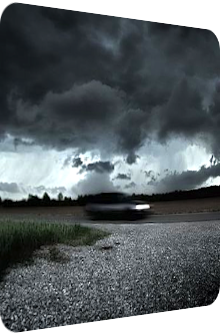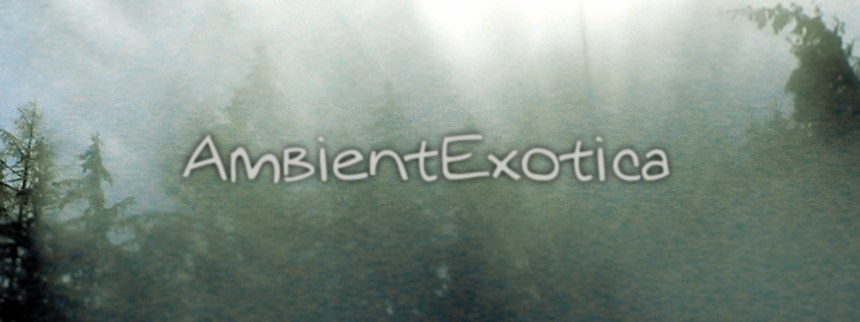
Alex Tiuniaev
Blurred
2012
Blurred is the latest Modern Classical work of Moscow-based pianist Alex Tiuniaev, and in regard to his earlier works, it expands the scope by a wide margin. Released on Heat Death Records in April 2012, it intersperses piano arrangements with Ambient soundscapes and gusts of electronic devices, the latter of which are usually put to the background, but once they’re noticeable, they enhance both the variety and tonality of the compositions for the better. The most complete edition is the CD version, with an additional four bonus tracks – most of them highly intriguing – that are missing on the digital download version. You can listen to the whole album on Alex Tiuniaev's Bandcamp site here. As the album cover already implies, this is definitely no sun-soaked music, which is all the more surprising since syrupy Pop songs are a domain of Tiuniaev as well, as he has shown on his proper debut Artificial Symphony in 2005. Blurred is much more doleful and melancholic, and since this is its dominant mood in most of the tracks, ambiguous devices and sudden bursts of happiness are all the more welcome and potentially unexpected, and the premise of this album is the skillful entanglement of these counterpointing particles that morph a certain composition into something else. Further noteworthy particularities comprise of the high amount of piano arrangements, and it needs a somewhat skilled listener to soak these minimal pieces in. Once this is accomplished in one way or the other, Tiuniaev succeeds in delivering many compositions that rely heavily on the interplay, with synths, orchestra strings and chimes all intertwined to form an intriguing mélange that all of a sudden isn’t as doleful as it was at the beginning. The serious approach shouldn’t put you off, as there are many moods and styles to be found on Blurred, together with largely unsuspected concoctions and actually awe-inspiring surprises that break the carefully set up formula of this Modern Classical piece. You can read more about the whole album and these instances in the following paragraphs.
The Kids And The Rain launches the album with a beatless, seemingly piano-only vignette of melancholia that is mainly fueled by the crystalline main melody, whereas the golden-shimmering tercets inject warmth and comfort in an otherwise strictly minimal track. I’m usually bad in describing such concentrated, focused Modern Classical tracks, but one thing boosted my interest: the sustain of the final chord fades out slowly, although the composition doesn’t end, as the resonating sound is electronically altered and twisted, sounding like a trembling string that wouldn’t be out of place in a Drone setting. Whereas The Kids And The Rain was stripped to its bones, Daylight keeps the sepia-colored nostalgia up, but launches with luxurious orchestra strings that inherit majestic memories as well as a doleful yearning. Deeply droning electric bass accents accompany this wonderful arrangement, and Jóhann Jóhannsson’s IBM 1401: A User’s Manual of 2006 comes to mind on more than one occasion. It’s a highly entrancing, very cinematic, but streamlined string piece with mellow washes and no harsh differences in volume. Huge! We Were All Fishes Once is another piano piece that meanders along in a liquid fashion, linking back to its title. Even though it’s a mellifluous dob, there’s a certain tension and upbeat tempo, with intertwined phases of staccato chords, quiescence and carefully built crescendos. All these things don’t matter in the end if the melody isn’t catchy. Luckily, here it truly is. Oscillating between cinematic momentums and the well-known Pop-driven structure of a repetitive saccharine motif, its recognition value is high, despite its minimal approach. Lost In Tokyo is another huge favorite of mine, expanding the intrinsic setting for the first time, and glaringly so, for it entangles auspiciously mesmeric backing synth washes with spellbinding orchestra strings, glittering bells in tandem with crystalline shards and the occasionally spectral Doppler effect-laden guitar string. The soundscape is magnanimously erected, juxtaposing frosty scintillae to encapsulating streams of thermal heat. A towering composition and I strongly advise you to check it out on the given Bandcamp link.
Faded Photographs is a two-minute piece that is once again driven by a dusky piano melody, but this time, there are barely noticeable ornaments intertwined, for example electronically filtered strings that inherit the refreshing cliché of a late 60’s psychedelia, as well as whirring glockenspiel sparkles that are placed around the nucleus. While the main melody is expectedly sad, the mentioned curlicues add positive lightness and glints of jocular feelings, lessening the crestfallen aura immensely. While The Wild Winds Weep is an even shorter interlude with fuller piano chords and their solemn conflations depicting an orange-colored wasteland, Um Langan Aldur brings back vivacious colors and rose-tinted memories, as a repetitively spiraling piano motif is expanded with the help of piercing static noise strings of the gelid kind and a wonderful inclusion of a harmonica shuttling between dolorousness and jauntiness. All devices create a lush panorama that is still slightly melancholic in order to fit with the overarching topos, but bright enough to display a new superstructure. The Human Abstract builds on this mood, as it is yet another piano-only composition of less than two minutes that is mostly played in major. Carefully touched piano keys exchange with effervescent ones, poignantly referring back to the title, so it seems. The almost twelve minutes long Origins is the centerpiece of Blurred, and seems to come from another artist, another album, another world, as it is so hugely different in style, presentation and its setup: thick synthetic drone layers of the aquatic-hazy kind mesh with the luminescence of coruscating plinks in the distance, and while this track wouldn’t be out of place on Kompakt’s Pop Ambient series, the galactic mood it evokes can instead be better linked to the deceased clarinetist Tony Scott and his composition Golden Prophet Of The 21st Century of his eery electroacoustic masterpiece of the late 80’s, Voyage Into A Black Hole. If you don’t believe the resemblence, pre-listen to these pieces back to back via iTunes, for instance, as the similarities are astonishing! Tiuniaev’s Origins, however, is even deeper thanks to the bass river that floats through the scenery and the celestially cherubic synth washes. It’s an awe-inspiring Drone track that is completely detached from each and every track that was heretofore presented. And so it shall remain, as the final piano piece, called The King, presents fragile flows of festiveness in over four minutes; the first piano chords appear around the two-minute mark, providing the nostalgic warmth that makes up the parabolic nexus of the track, before frostier piano notes mark the downfall of the track.
If you’ve bought the digital version of Blurred which is only available at Audio Gourmet for the time being, you are missing out on four bonus tracks which are only available on CD. I think it is worth mentioning them nonetheless, so I've dedicated this paragraph to them. I Can Feel Again is a particularly blithesome track, with wonderfully lucent piano tercets and two or three trembling orchestra strings that augment the graceful diorama that is aurally constructed. It’s a shame that this track didn’t make it on the CD version of the album, as Alex Tiuniaev skillfully flits between a Baroque setting and the well-known contemporary Modern Classical arch. Green And White, on the other hand, features another of his many solo performances on the piano, with a four-note base frame being married to accentuating notes in this predominantly chord-free vignette. The piano arrangement Merry Christmas Once Again is thankfully cliché-free and features the most strikingly hammered piano chords that evoke the impetus and good-natured outburst that is often amiss in the material of the CD version, though it blends well with the established mood, since there are gentler passages in pastel colors interwoven. The final bonus track takes the cake, however: Dark And Gloomy Clouds Hung Low Over Exeter marries cello and violin strings – the latter occasionally played in pizzicato style – with oboes, darkly droning tubas and barely noticeable piano intersections. The song is the most progressive artifact of the bunch, builds a definitive momentum and unleashes its various instruments step by step. Curiously intimidating and benign at the same time, this piece is memorable and tremendously catchy, validating the rule of thumb of B-side or bonus material being oftentimes better and aesthetically more valuable than the original concoctions of a work.
Alex Tiuniaev’s Blurred is a mature album and stands in striking contrast to his earliest works. As it is indecisive about its real focus, it is presenting a wealth of material that is clearly not made for everyone, as the stylistic range is broad. An artist’s progression like Tiuniaev’s has been experienced many times before, so it is up to the listener to decide whether the gleeful, jovial technicolor Pop-focused anthems of, say, his 2005 entry Artificial Symphony, are the superior compositions, or the hibernal figments of his 2009 release Ethereal Winter Ambience remain the cream of the crop or, finally, whether the mournful solemnity of Blurred is the final piece of the puzzle that shows the complete spectrum of his skills. Whatever your opinion is, Blurred is strictly Modern Classical, with easy to grasp piano melodies, but harder to digest woeful in(ter)jections in the forms of many minor keys which are allotted all over the material. Obvious showstoppers remain the exquisite Origins with its synthesizer-fueled dronescape that caters to the lovers of electronic Ambient music, the upbeat piano piece We Were All Fishes Once which is much more lively if that is what you’re searching for, the scintillating winter landscape of Lost In Tokyo with its various bells and blazingly bright atmosphere, and the deliberately reduced but fully orchestral landscape of Um Langan Aldur. Fans of Jóhann Jóhannsson should definitely check this album out, everyone else who prefers more electronic and brighter settings should consider the aforementioned, more stringent works of Alex Tiuniaev.
Further listening:
Although you cannot buy the digital version of Blurred via BandCamp at time of writing this review, you can listen to all regular tracks and the bonus material in full over there.
[Update Sep. 20, 2012: I have previously stated that the download version contains the bonus tracks, while the CD incarnation omits them. It is exactly vice versa as Alex Tiuniaev told me in an email. My apologies! Those errors are now corrected.]
Ambient Review 123: Alex Tiuniaev – Blurred (2012). Originally published on Sep. 19, 2012 at AmbientExotica.com.
